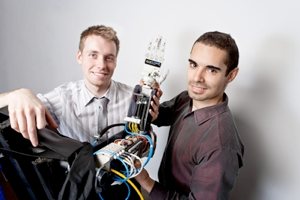
Ryerson Biomedical Engineering Students Invent Brain-Controlled Prosthetic Arm

Ryerson biomedical engineering students Michal Prywata and Thiago Caires.
Biomedical engineering students Michal Prywata and Thiago Caires have created a prosthetic arm that is controlled by human brain signals, a groundbreaking first in medical prosthetics.
“In just ten minutes of practicing, a person can pick up the mind-control aspect of the technology,” said Prywata.
The Artificial Muscle-Operated (AMO) Arm brings amputees remarkably close to having a natural limb, by giving them a far better range of movement compared to traditional prosthetic arms. It also helps users avoid invasive surgeries and can potentially save a fortune in costs.
The AMO Arm is controlled by the user’s brain signals, which manipulate pneumatic pumps and valves to create movements via ‘artificial muscles.’ Whereas, traditional prosthetic limbs offer limited movement through electrical and mechanical components.
“Independent finger movements require many more sensors,” said Caires. “For example, while not impossible, it’s still quite difficult to grab a key and unlock a door.”
The virtual muscles are expanded and contracted by using compressed air from a small, refillable tank that the user can carry in their pocket.
Even though Prywata is only in his second year at Ryerson, and Caires is in his third, the team has formed their own company, Bionik Laboratories Inc. and are currently seeking three patents for the AMO Arm and their other technologies.
Schools mentioned: Ryerson University

